
- Homepage
- Brand
- Artoria (30)
- Artoria Limoges (13)
- Atelier (7)
- Chamart (26)
- La Reine (11)
- Lagloriette (9)
- Le Tallec (23)
- Limoge (7)
- Limoges (2536)
- Limoges - Chamart (11)
- Limoges - Eximious (8)
- Limoges - Rochard (18)
- Limoges France (27)
- Limoges Rochard (7)
- Parry Vieille (8)
- Peint Main (14)
- Rochard (111)
- Rochard Limoges (53)
- Tiffany & Co (17)
- Tiffany & Co. (25)
- ... (3006)
- Features
- 24k Gold, Retired (2)
- 3d Effect (8)
- 3d Effect, Unboxed (10)
- Boxed (717)
- Boxed, Hand Painted (13)
- Boxed, With Handle (3)
- Branded (3)
- Framed (2)
- Hand Painted (371)
- Hand Painted, Signed (3)
- Handmade (19)
- Hinged (14)
- Limited Edition (35)
- Monogram (2)
- Musical (5)
- Removable (21)
- Retired (12)
- Signed (4)
- Trinket Box (8)
- Unboxed (11)
- ... (4704)
- Packaging
- Pattern
- Subject
- Type
- Bottles (3)
- Box (46)
- Boxes (15)
- Boxes / / Trinkets (2)
- Boxes / Trinkets (3)
- Dresser Box (3)
- Hinged Box (2)
- Hinged Trinket Box (201)
- Jewelry Box (4)
- Keepsake Trinket Box (2)
- Limoges Box (5)
- Limoges Trinket Box (4)
- Miniature (3)
- Porcelin (2)
- Tray (2)
- Trinket (3)
- Trinket / Pill Box (2)
- Trinket Box (1773)
- Trinket Boxes (2)
- Trinket Pill Box (2)
- ... (3888)
Russian HAND PAINTED KHOLUI LACQUER box Fairy Tale Frog Princess ORLOVA signed
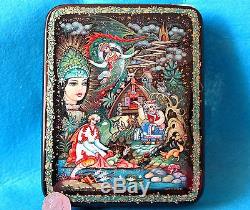
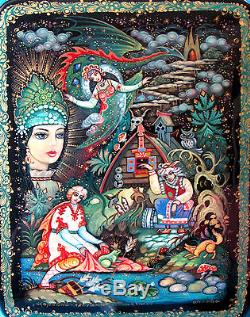
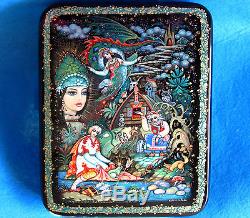
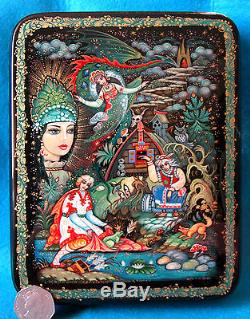
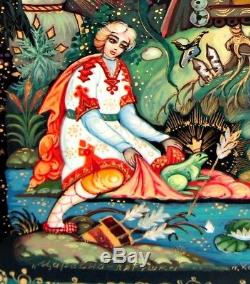
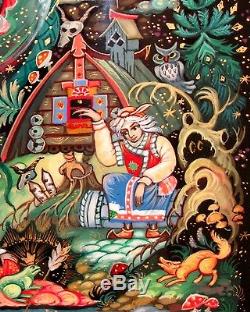
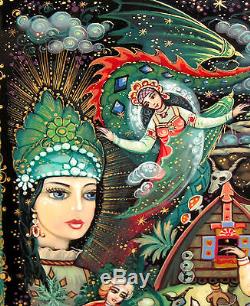
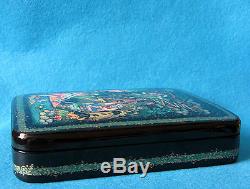
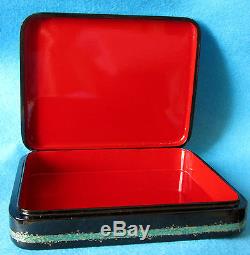
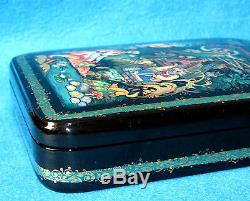


This is a beautiful and unique Russian LARGE papier mache jewellery box " Frog Princess", hand painted. The box measures 19.5 cm or 7 11/16 inches by 5.5 cm or 6 1/8 inches.
It is 2.5 cm deep. The box is signed with the artists name ORLOVA. It also has Kholui and Tsarevna Frog written on it.
Thise box is a truly beautiful work of art, finished all round to the highest standard by one of the very best artists in Russia! IN an old, old Russian tsarstvo, I do not know when, there lived a sovereign prince with the princess his wife. They had three sons, all of them young, and such brave fellows that no pen could describe them. The youngest had the name of Ivan Tsarevitch.
One day their father said to his sons. My dear boys, take each of you an arrow, draw your strong bow and let your arrow fly; in whatever court it falls, in that court there will be a wife for you. The arrow of the oldest Tsarevitch fell on a boyar-house just in front of the terem where women live; the arrow of the second Tsarevitch flew to the red porch of a rich merchant, and on the porch there stood a sweet girl, the merchant's daughter. The youngest, the brave Tsarevitch Ivan, had the ill luck to send his arrow into the midst of a swamp, where it was caught by a croaking frog.
Ivan Tsarevitch came to his father: How can I marry the frog? Never mind,'' replied his father, you have to marry the frog, for such is evidently your destiny. Thus the brothers were married: the oldest to a young boyarishnia, a nobleman's child; the second to the merchant's beautiful daughter, and the youngest, Tsarevitch Ivan, to a croaking frog.After a while the sovereign prince called his three sons and said to them:Have each of your wives bake a loaf of bread by to-morrow morning. There was no smile on his face, and his brow was clouded. Dear husband of mine, Tsarevitch Ivan, why so sad?
Was there anything disagreeable in the palace? " "Disagreeable indeed, " answered Ivan Tsarevitch; "the Tsar, my father, wants you to bake a loaf of white bread by tomorrow. Go to bed; the morning hour is a better adviser than the dark evening. The Tsarevitch, taking his wife's advice, went to sleep.
Then the frog threw off her frogskin and turned into a beautiful, sweet girl, Vassilissa by name. She now stepped out on the porch and called aloud: Nurses and waitresses, come to me at once and prepare a loaf of white bread for to-morrow morning, a loaf exactly like those I used to eat in my royal father's palace. In the morning Tsarevitch Ivan awoke with the crowing cocks, and you know the cocks and chickens are never late. Yet the loaf was already made, and so fine it was that nobody could even describe it, for only in fairyland one finds such marvelous loaves. It was adorned all about with pretty figures, with towns and fortresses on each side, and within it was white as snow and light as a feather.
The Tsar father was pleased and the Tsarevitch received his special thanks. "Now there is another task, " said the Tsar smilingly. Have each of your wives weave a rug by to-morrow. Tsarevitch Ivan came back to his home. There was no smile on his face and his brow was clouded.
Dear Tsarevitch Ivan, my husband and master, why so troubled again? " "How can I be otherwise?
The Tsar, my father, has ordered a rug by tomorrow. Go to bed; go to sleep. The morning hour will bring help.
Again the frog turned into Vassilissa, the wise maiden, and again she called aloud: Dear nurses and faithful waitresses, come to me for new work. Weave a silk rug like the one I used to sit upon in the palace of the king, my father. When the cocks began their early "cock-a-doodle-doo, " Tsarevitch Ivan awoke, and lo! There lay the most beautiful silk rug before him, a rug that no one could begin to describe.
Threads of silver and gold were interwoven among bright-colored silken ones, and the rug was too beautiful for anything but to admire. The Tsar father was pleased, thanked his son Ivan, and issued a new order. He now wished to see the three wives of his handsome sons, and they were to present their brides on the next day. Cloudy was his brow, more cloudy than before.
Tsarevitch, my dear husband and master, why so sad? Hast thou heard anything unpleasant at the palace? My father, the Tsar, ordered all of us to present our wives to him. Now tell me, how could I dare go with thee? " "It is not so bad after all, and might be much worse, answered the frog, gently croaking. Thou shalt go alone and I will follow thee. When thou hearest a noise, a great noise, do not be afraid; simply say:'There is my miserable froggy coming in her miserable box. The two elder brothers arrived first with their wives, beautiful, bright, and cheerful, and dressed in rich garments. Both the happy bridegrooms made fun of the Tsarevitch Ivan. They laughingly said to him. Why didst thou not bring thy wife along with thee? Was there no rag to cover her?Where couldst thou have gotten such a beauty? We are ready to wager that in all the swamps in the dominion of our father it would be hard to find another one like her. And they laughed and laughed. The palace trembled, the guests were all frightened. Tsarevitch Ivan alone remained quiet and said: No danger; it is my froggy coming in her box.
To the red porch came flying a golden carriage drawn by six splendid white horses, and Vassilissa, beautiful beyond all description, gently reached her hand to her husband. He led her with him to the heavy oak tables, which were covered with snow-white linen and loaded with many wonderful dishes such as are known and eaten only in the land of fairies and never anywhere else. The guests were eating and chatting gayly. Vassilissa drank some wine, and what was left in the tumbler she poured into her left sleeve.
She ate some of the fried swan, and the bones she threw into her right sleeve. The wives of the two elder brothers watched her and did exactly the same.
When the long, hearty dinner was over, the guests began dancing and singing. The beautiful Vassilissa came forward, as bright as a star, bowed to her sovereign, bowed to the honorable guests and danced with her husband, the happy Tsarevitch Ivan. While dancing, Vassilissa waved her left sleeve and a pretty lake appeared in the midst of the hall and cooled the air.
She waved her right sleeve and white swans swam on the water. The Tsar, the guests, the servants, even the gray cat sitting in the corner, all were amazed and wondered at the beautiful Vassilissa. Her two sisters-in-law alone envied her. When their turn came to dance, they also waved their left sleeves as Vassilissa had done, and, oh, wonder! They sprinkled wine all around. They waved their right sleeves, and instead of swans the bones flew in the face of the Tsar father. The Tsar grew very angry and bade them leave the palace. In the meantime Ivan Tsarevitch watched a moment to slip away unseen. He ran home, found the frogskin, and burned it in the fire.Vassilissa, when she came back, searched for the skin, and when she could not find it her beautiful face grew sad and her bright eyes filled with tears. She said to Tsarevitch Ivan, her husband: Oh, dear Tsarevitch, what hast thou done?
There was but a short time left for me to wear the ugly frogskin. The moment was near when we could have been happy together forever. Look for me in a far-away country to which no one knows the roads, at the palace of Kostshei the Deathless; and Vassilissa turned into a white swan and flew away through the window. Then he prayed to the almighty God, and making the sign of the cross northward, southward, eastward, and westward, he went on a mysterious journey.No one knows how long his journey was, but one day he met an old, old man. He bowed to the old man, who said: Good-day, brave fellow.
What art thou searching for, and whither art thou going? Tsarevitch Ivan answered sincerely, telling all about his misfortune without hiding anything. And why didst thou burn the frogskin? It was wrong to do so.
Vassilissa was born wiser than her own father, and as he envied his daughter's wisdom he condemned her to be a frog for three long years. But I pity thee and want to help thee. Here is a magic ball. In whatever direction this ball rolls, follow without fear.
Ivan Tsarevitch thanked the good old man, and followed his new guide, the ball. Long, very long, was his road. One day in a wide, flowery field he met a bear, a big Russian bear. Ivan Tsarevitch took his bow and was ready to shoot the bear. "Do not" kill me, kind Tsarevitch, said the bear.Who knows but that I may be useful to thee? And Ivan did not shoot the bear. Above in the sunny air there flew a duck, a lovely white duck.
Again the Tsarevitch drew his bow to shoot it. But the duck said to him: Do not kill me, good Tsarevitch. I certainly shall be useful to thee some day. And this time he obeyed the command of the duck and passed by.
Continuing his way he saw a blinking hare. The Tsarevitch prepared an arrow to shoot it, but the gray, blinking hare said: Do not kill me, brave Tsarevitch. I shall prove myself grateful to thee in a very short time. The Tsarevitch did not shoot the hare, but passed by. He walked farther and farther after the rolling ball, and came to the deep blue sea.On the sand there lay a fish. I do not remember the name of the fish, but it was a big fish, almost dying on the dry sand.
" prayed the fish, "have mercy upon me and push me back into the cool sea. The Tsarevitch did so, and walked along the shore. The ball, rolling all the time, brought Ivan to a hut, a queer, tiny hut standing on tiny hen's feet.
"--for so in Russia do they name small huts--"Izboushka, I want thee to turn thy front to me, cried Ivan, and lo! The tiny hut turned its front at once.
Ivan stepped in and saw a witch, one of the ugliest witches he could imagine. Was his greeting from the witch. Is it the way in holy Russia to ask questions before the tired guest gets something to eat, something to drink, and some hot water to wash the dust off? Baba Yaga, the witch, gave the Tsarevitch plenty to eat and drink, besides hot water to wash the dust off. Soon he became talkative, and related the wonderful story of his marriage.
He told how he had lost his dear wife, and that his only desire was to find her. "I know all about it, " answered the witch.She is now at the palace of Kostshei the Deathless, and thou must understand that Kostshei is terrible. He watches her day and night and no one can ever conquer him. His death depends on a magic needle.
That needle is within a hare; that hare is within a large trunk; that trunk is hidden in the branches of an old oak tree; and that oak tree is watched by Kostshei as closely as Vassilissa herself, which means closer than any treasure he has. Then the witch told Ivan Tsarevitch how and where to find the oak tree.Ivan hastily went to the place. But when he perceived the oak tree he was much discouraged, not knowing what to do or how to begin the work. That old acquaintance of his, the Russian bear, came running along, approached the tree, uprooted it, and the trunk fell and broke. A hare jumped out of the trunk and began to run fast; but another hare, Ivan's friend, came running after, caught it and tore it to pieces. Out of the hare there flew a duck, a gray one which flew very high and was almost invisible, but the beautiful white duck followed the bird and struck its gray enemy, which lost an egg.
That egg fell into the deep sea. Ivan meanwhile was anxiously watching his faithful friends helping him. But when the egg disappeared in the blue waters he could not help weeping.All of a sudden a big fish came swimming up, the same fish he had saved, and brought the egg in his mouth. How happy Ivan was when he took it! He broke it and found the needle inside, the magic needle upon which everything depended.
At the same moment Kostshei lost his strength and power forever. Ivan Tsare-vitch entered his vast dominions, killed him with the magic needle, and in one of the palaces found his own dear wife, his beautiful Vassilissa. He took her home and they were very happy ever after. The boxes most widely sought after come from one of four small Russian villages - Palekh, Fedoskino, Kholui, and Mstera. Special schools have been established at these places where artists train for four years before they become members of each village's art community.
Each village also has its unique style. Is among the most ancient villages in the Vladimir-Suzdal area. Legend has it that arts and crafts were practiced in these parts from as early as the time of the Tatar-Mongol invasion. In the 1230-40s the highly developed urban culture of Northeastern Russia was almost wiped out by the Tatar-Mongol hordes. The local people fled to remote marshlands that were inaccessible to the Tatar cavalry. Kholui may well have been such a place, its name meaning "marshlands" in Finno-Ugrian languages. The first recorded mention of the settlement in Kholui goes back to the mid-16th century. It is the deed issued by the grand prince Ivan Vasilievich to the Trinity-St.Sergius Monastery near Moscow relieving the Starodubsky salt works of obligations to the state. This indicates that at the time Kholui was owned by the monastery, which supplied Moscow with that highly prized commodity, salt.
Document of the 17th century already mention Kholui icon-painters. These documents are dated 1613, the year when the Kholui sloboda (settlement exempt from state obligations) was given as an allodium to Prince Dmitry Mikhailovich Pozharsky who liberated Moscow besieged by the Poles in 1612.The level of literacy in the icon-painting centers of Kholui, Palekh and Mstera was markedly superior to that among the peasants of surrounding villages. In 1861 the village community opened the Sofinskaya School in Kholui with the assistance of Duchess Sofia Bobrinskaya. Almost the whole male population of Kholui was engaged in iconmaking. In the 1870s, many icon-painting shops sprang up, some of them were quite large, such as the two-storied workshop of Blinnichev which had craftsmen from Kholui and Palekh: among them were the Kryukovs-father Alexander and his sons Pavel and Ivan; the Denisovs-father Ivan and sons Ivan and Alexander; V.
Professor Kondakov, who visited the old icon-making centers of Palekh, Mstera and Kholui in 1900, pointed out that the craft of icon painting was sustained in those areas thanks to old legends. Student of icon-painting centers in the Vladimir gubernia in the 19th century, including Palekh, Mstera and Kholui pointed out that Kholui as an icon-paining center Predated all others. The first experiments in papier-mch miniature painting were made in Kholui as early as in 1928. By that time the artists of Palekh, looking for ways to apply their icon-painting skills, Started decorating papier-mch boxes following the technology they borrowed from the Fedoskino artists. But while the latter used oil, the Palekh artists used tempera technique. Kholui artists decorated several semi-processed plates and boxes made in Palekh. Kholui lacquer workshops were founded in 1993 on the basis of an artistic Guild, which existed since 1934. Kholui miniature painting is executed with egg yolk tempera over papier-mch articles.They represent folklore and historic subjects, everyday life motive with stylized figures, which are depicted against the stylized landscape background. Famous artists are involved into the workshops activities; each of them is of person of vivid talent and inimitable individuality. Their creative won great fame - their artworks were rewarded with high awards, including the Great Silver Medal of the International Exhibition in Bruxelles.
The artists were rewarded with honorary titles of Peoples Artist and Honored Artist of the Russian Federation; they also were honored with the Russian Federation State Prize named after Ilya Repin. The item "Russian HAND PAINTED KHOLUI LACQUER box Fairy Tale Frog Princess ORLOVA signed" is in sale since Thursday, March 5, 2015. This item is in the category "Collectibles\Decorative Collectibles\Decorative Collectible Brands\Limoges\Trinket Boxes".The seller is "tom3burma" and is located in Norwich. This item can be shipped worldwide.
- UPC: Does not apply
- Brand: Unbranded
- MPN: Does not apply

